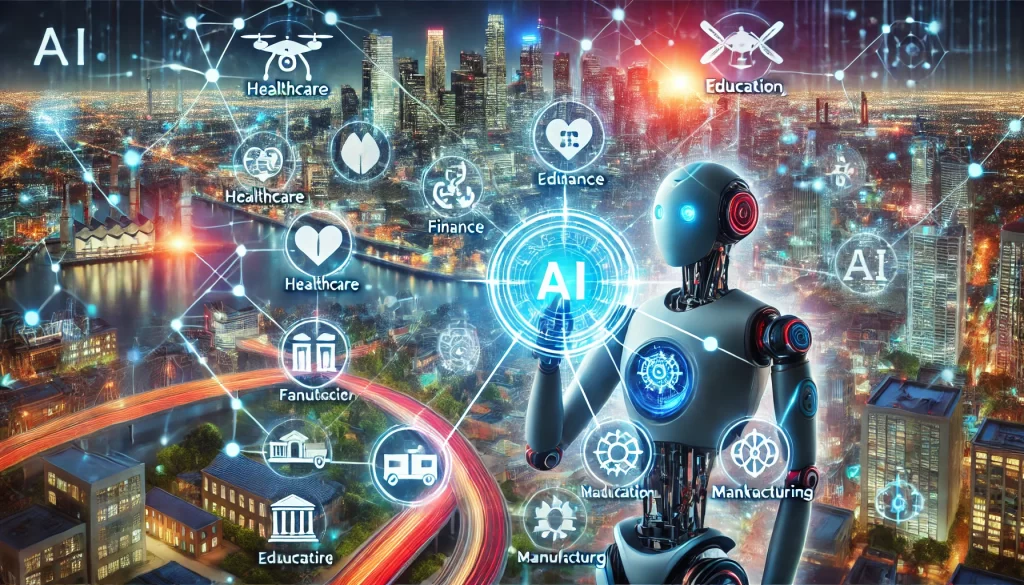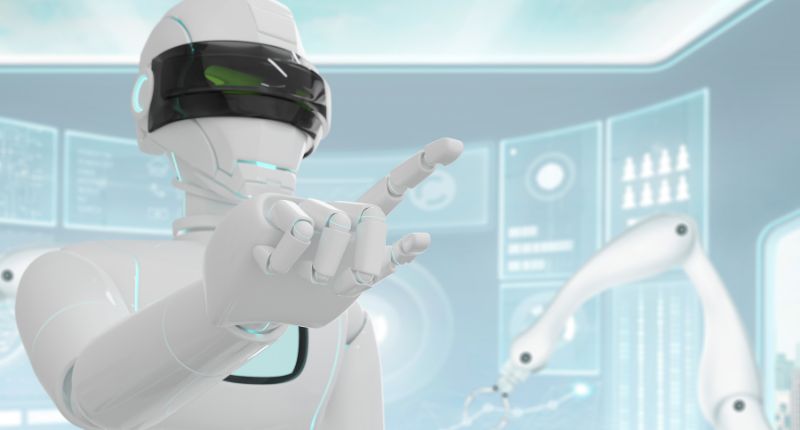Artificial Intelligence (AI) has rapidly transformed from a futuristic concept to a practical tool reshaping industries globally. From automating mundane tasks to enabling groundbreaking innovations, AI offers boundless opportunities for businesses willing to leverage its potential. As we step further into the digital age, understanding the diverse AI business opportunities can provide entrepreneurs and companies with a significant competitive edge. In this comprehensive guide, we delve into the key domains where AI is driving change and explore how businesses can capitalize on these advancements.
Artificial intelligence (AI) is no longer a futuristic concept. It’s here, and it’s transforming industries across the globe. From healthcare to finance, retail to manufacturing, AI is revolutionizing how businesses operate, innovate, and compete. In this comprehensive blog post, we’ll explore the vast landscape of AI business opportunities, delve into specific niches, and discuss the strategies and considerations for success in this exciting field.
The AI Revolution: A Paradigm Shift
AI, with its ability to analyze massive datasets, identify patterns, and make intelligent decisions, is empowering businesses to achieve unprecedented levels of efficiency, productivity, and customer satisfaction.
Key AI Capabilities Driving Business Transformation:
- Machine Learning: Algorithms that learn from data without explicit programming, enabling businesses to predict future trends, personalize experiences, and optimize operations.
- Natural Language Processing (NLP): Algorithms that enable computers to understand, interpret, and generate human language, powering chatbots, sentiment analysis, and language translation.
- Computer Vision: Algorithms that enable computers to “see” and interpret images and videos, leading to applications in facial recognition, object detection, and medical imaging.
- Deep Learning: A subset of machine learning that uses artificial neural networks to mimic the human brain, enabling advanced pattern recognition and decision-making.
AI Business Opportunities: A Diverse Landscape
The applications of AI are virtually limitless. Here are some of the most promising business opportunities:
1. Healthcare:
- AI-powered diagnostics: Developing AI algorithms to analyze medical images, detect diseases early, and personalize treatment plans.
- Drug discovery and development: Utilizing AI to accelerate the drug discovery process, identify potential drug candidates, and predict clinical trial outcomes.
- Personalized medicine: Leveraging AI to tailor treatment plans to individual patients based on their genetic makeup, lifestyle, and medical history.
- Telemedicine and remote patient monitoring: Developing AI-powered platforms for remote patient monitoring, virtual consultations, and home healthcare.
2. Finance:
- Fraud detection and prevention: Employing AI to identify and prevent fraudulent transactions, such as credit card fraud and money laundering.
- Algorithmic trading: Utilizing AI algorithms to automate trading decisions, optimize investment portfolios, and predict market trends.
- Credit risk assessment: Developing AI models to assess creditworthiness and make lending decisions more accurately.
- Customer service and support: Implementing AI-powered chatbots and virtual assistants to provide 24/7 customer support and answer financial queries.
3. Retail:
- Personalized recommendations: Utilizing AI to analyze customer behavior and preferences to provide personalized product recommendations.
- Inventory management and supply chain optimization: Employing AI to optimize inventory levels, predict demand, and streamline supply chains.
- Customer service automation: Implementing AI-powered chatbots to handle customer inquiries, provide product information, and resolve issues.
- Dynamic pricing: Utilizing AI to adjust prices in real-time based on demand, competition, and other factors.
4. Manufacturing:
- Predictive maintenance: Employing AI to predict equipment failures and schedule maintenance proactively, reducing downtime and costs.
- Quality control: Utilizing AI-powered vision systems to inspect products for defects and ensure quality.
- Process optimization: Employing AI to optimize manufacturing processes, improve efficiency, and reduce waste.
- Robotics and automation: Developing AI-powered robots for tasks such as assembly, packaging, and material handling.
5. Transportation and Logistics:
- Autonomous vehicles: Developing self-driving cars, trucks, and drones for transportation and delivery.
- Route optimization: Utilizing AI to optimize delivery routes, reduce fuel consumption, and improve delivery times.
- Predictive maintenance: Employing AI to predict equipment failures and schedule maintenance proactively for transportation vehicles.
- Traffic management: Utilizing AI to analyze traffic patterns and optimize traffic flow.
6. Education:
- Personalized learning: Developing AI-powered platforms that adapt to individual students’ learning styles and pace, providing personalized learning experiences.
- Automated grading and assessment: Utilizing AI to automate grading tasks, freeing up teachers’ time for more personalized instruction.
- Intelligent tutoring systems: Developing AI-powered tutors that provide personalized guidance and support to students.
- Predictive analytics: Utilizing AI to predict student performance and identify at-risk students.
7. Customer Service:
- Chatbots and virtual assistants: Developing AI-powered chatbots and virtual assistants to provide 24/7 customer support, answer questions, and resolve issues.
- Sentiment analysis: Utilizing AI to analyze customer feedback and social media sentiment to understand customer opinions and preferences.
- Personalized customer experiences: Utilizing AI to personalize customer interactions and experiences, building stronger customer relationships.
8. Cybersecurity:
- Threat detection and prevention: Employing AI to detect and prevent cyberattacks, such as malware attacks and phishing scams.
- Network security: Utilizing AI to monitor network traffic and identify suspicious activity.
- Incident response: Employing AI to automate incident response processes and accelerate the resolution of security incidents.
9. Agriculture:
- Precision agriculture: Utilizing AI to optimize crop yields, monitor soil health, and predict weather patterns.
- Pest and disease control: Employing AI-powered drones and sensors to detect and control pests and diseases.
- Automated irrigation and fertilization: Utilizing AI to optimize irrigation and fertilization schedules, reducing water and fertilizer usage.
- Supply chain management: Utilizing AI to optimize the agricultural supply chain, from planting to harvesting and distribution.
10. Entertainment:
- Content recommendation: Utilizing AI to provide personalized content recommendations to users, such as movies, music, and books.
- Content creation: Utilizing AI to generate creative content, such as music, art, and literature.
- Virtual and augmented reality: Developing AI-powered virtual and augmented reality experiences for entertainment and gaming.
- Personalized gaming experiences: Utilizing AI to create personalized gaming experiences, adapting to individual players’ preferences and skills.
Strategies for Success in the AI Business Landscape
To succeed in the AI business landscape, businesses need to adopt a strategic approach:
- Data-driven decision making: Leverage data analytics and AI to gain insights into customer behavior, market trends, and operational efficiency.
- Invest in talent: Build a strong team of AI experts, including data scientists, machine learning engineers, and AI researchers.
- Embrace experimentation and innovation: Continuously experiment with new AI technologies and applications to stay ahead of the curve.
- Focus on customer value: Develop AI solutions that deliver real value to customers, solving their problems and improving their lives.
- Build ethical and responsible AI systems: Ensure that AI systems are fair, transparent, and accountable, avoiding biases and ethical pitfalls.
- Collaborate with partners: Partner with other businesses, research institutions, and government agencies to accelerate AI development and adoption.
The Future of AI: A World of Possibilities
As AI continues to evolve, the opportunities for businesses will only expand. We can expect to see even more innovative applications of AI in the years to come, transforming industries and creating new markets.
Some of the exciting trends to watch include:
- The rise of edge AI: Bringing AI processing power closer to the edge devices, enabling real-time decision-making and reducing latency.
- The integration of AI with other emerging technologies: Such as the Internet of Things (IoT), blockchain, and 5G, creating powerful new capabilities.
- The democratization of AI: Making AI tools and technologies more accessible to businesses of all sizes.
- The ethical and societal implications of AI: Addressing the ethical and societal challenges of AI, such as job displacement, privacy concerns, and algorithmic bias.
The future of AI is bright, and businesses that embrace this transformative technology will be well-positioned to thrive in the years to come. By understanding the opportunities, developing the necessary skills, and adopting a strategic approach, businesses can harness the power of AI to drive innovation, create value, and shape the future.
1. AI in Healthcare: Revolutionizing Patient Care and Diagnostics
AI has made remarkable strides in the healthcare industry, enabling better diagnostics, personalized medicine, and efficient hospital management. Machine learning algorithms can analyze medical images, identify patterns, and assist in diagnosing diseases like cancer and cardiovascular conditions with unprecedented accuracy.
Opportunities:
- AI-Powered Diagnostics Tools: Developing applications that use AI for early disease detection, such as skin cancer through image analysis or diabetic retinopathy using retinal scans.
- Virtual Health Assistants: Chatbots and AI systems that provide 24/7 patient support, schedule appointments, and offer medication reminders.
- Drug Discovery: AI can accelerate the process of drug development by predicting molecular interactions and identifying potential drug candidates faster than traditional methods.
2. E-Commerce: Personalized Shopping Experiences
The e-commerce industry has embraced AI to enhance customer experiences and optimize operations. AI-powered recommendation systems analyze user behavior, preferences, and purchase history to provide personalized product suggestions.
Opportunities:
- AI-Driven Recommendations: Building recommendation engines that improve conversion rates for online retailers.
- Inventory Management: AI systems that predict demand, optimize stock levels, and reduce waste.
- Chatbots for Customer Support: AI chatbots that handle customer queries efficiently, reducing response times and operational costs.
3. Manufacturing: Smart Automation and Predictive Maintenance
AI is revolutionizing manufacturing through automation, predictive maintenance, and quality control. Smart factories equipped with AI systems can monitor equipment in real time, predict failures, and optimize production processes.
Opportunities:
- Predictive Maintenance Solutions: Creating platforms that analyze sensor data to forecast equipment breakdowns and schedule maintenance proactively.
- Quality Inspection Systems: Using computer vision to detect defects in products during the manufacturing process.
- Robotic Process Automation (RPA): Automating repetitive tasks in assembly lines or logistics using AI-powered robots.
4. Finance: Enhancing Decision-Making and Fraud Detection
In the finance sector, AI is helping businesses make informed decisions, detect fraud, and improve customer experiences. AI systems can analyze vast amounts of financial data to uncover trends, risks, and opportunities.
Opportunities:
- Fraud Detection Tools: Developing AI systems that monitor transactions for unusual patterns and flag potential fraud.
- Personal Finance Assistants: Applications that help users manage budgets, track expenses, and provide financial advice.
- Algorithmic Trading Platforms: AI algorithms that execute trades based on real-time market data and predictive analytics.
5. Education: Personalized Learning Experiences
AI is transforming education by tailoring learning experiences to individual needs and enabling more efficient teaching methods. Adaptive learning platforms use AI to analyze student performance and provide customized content.
Opportunities:
- E-Learning Platforms: Developing AI-driven platforms that offer personalized courses and assessments.
- Virtual Tutors: AI systems that assist students with homework or language learning.
- Administrative Automation: Tools that streamline tasks like grading, scheduling, and student performance tracking.
6. Retail: Enhancing In-Store and Online Experiences
Retailers are leveraging AI to bridge the gap between physical stores and e-commerce, offering seamless shopping experiences. AI systems can analyze foot traffic, optimize store layouts, and improve supply chain management.
Opportunities:
- Smart Shelves: AI-powered shelves that track inventory in real time and alert staff about restocking needs.
- Customer Behavior Analysis: Tools that analyze in-store customer behavior to optimize layouts and product placements.
- Augmented Reality (AR) Shopping: Integrating AI with AR to allow customers to “try” products virtually before purchasing.
7. Transportation and Logistics: Optimizing Operations
AI is driving efficiency in the transportation and logistics sector by optimizing routes, reducing fuel consumption, and improving delivery times. Autonomous vehicles and drones are also becoming a reality, thanks to AI advancements.
Opportunities:
- Route Optimization Software: AI systems that calculate the most efficient routes for deliveries.
- Autonomous Delivery Solutions: Developing drones or self-driving vehicles for last-mile delivery.
- Fleet Management: Platforms that monitor fleet performance and optimize operations using real-time data.
8. Content Creation: Automating Creativity
AI is no longer limited to analytical tasks; it is now contributing to creative fields like content creation, graphic design, and video editing. AI tools can generate written content, design logos, and even compose music.
Opportunities:
- AI Writing Assistants: Platforms that help businesses create blog posts, emails, and social media content.
- Video Editing Tools: AI-powered software that automates video editing, adding effects, and generating subtitles.
- Design Automation: Tools that create marketing materials like banners, flyers, and logos based on user inputs.
9. AI in Agriculture: Smart Farming Solutions
Agriculture is embracing AI to address challenges like climate change, resource management, and food security. AI technologies enable precision farming, monitoring of crop health, and efficient resource utilization.
Opportunities:
- Crop Monitoring Systems: AI-powered drones and sensors that analyze crop health and soil conditions.
- Predictive Analytics for Yield: Tools that forecast crop yields based on weather and soil data.
- Automated Irrigation Systems: AI systems that optimize water usage to reduce waste and improve crop production.
10. Cybersecurity: Strengthening Digital Defenses
As cyber threats become more sophisticated, businesses are turning to AI to bolster their defenses. AI systems can detect anomalies, predict potential breaches, and respond to incidents in real time.
Opportunities:
- Threat Detection Tools: AI systems that analyze network traffic and identify suspicious activities.
- Automated Incident Response: Platforms that initiate predefined responses to cyberattacks, minimizing damage.
- Identity Verification Solutions: Using AI to enhance user authentication processes and reduce fraud.
11. Real Estate: Smarter Property Management
AI is transforming real estate by improving property management, streamlining transactions, and enhancing customer experiences. AI tools can analyze market trends, predict property values, and automate tenant interactions.
Opportunities:
- Virtual Property Tours: AI systems that create immersive 3D virtual tours for potential buyers or tenants.
- Market Analysis Tools: Platforms that predict property values and rental demand based on market trends.
- Tenant Management Solutions: Automating tasks like rent collection, maintenance requests, and lease renewals.
12. Energy Sector: Optimizing Resources
AI is playing a critical role in the energy sector by optimizing resource utilization, predicting energy demand, and facilitating the transition to renewable energy sources.
Opportunities:
- Energy Forecasting Systems: Tools that predict energy consumption patterns to optimize production.
- Smart Grid Solutions: AI systems that enhance the efficiency and reliability of power grids.
- Renewable Energy Management: Platforms that optimize the operation of wind turbines, solar panels, and other renewable energy sources.
Conclusion: Seizing AI Opportunities
The rapid evolution of AI presents businesses with an extraordinary array of opportunities. Whether it’s enhancing customer experiences, improving operational efficiency, or driving innovation, AI is a game-changer across industries. Entrepreneurs and companies that embrace AI early are better positioned to thrive in an increasingly competitive landscape.
To succeed, businesses should:
- Stay updated on AI trends and advancements.
- Invest in AI talent and tools.
- Focus on solving specific problems using AI solutions.
- Collaborate with AI experts and organizations.
The AI revolution is here, and it’s reshaping the way we work, live, and do business. By understanding and leveraging AI business opportunities, you can not only stay ahead but also drive meaningful change in your industry.
Experience the power of AI firsthand with ChatGPT. This cutting-edge conversational AI showcases how artificial intelligence can assist with tasks like content creation, brainstorming, coding, and more, revolutionizing the way we interact with technology.
Looking for inspiration to start your AI journey? Check out our guide on AI Startup Ideas: Transforming the Future with Artificial Intelligence. Discover innovative concepts and practical applications to launch a successful AI-driven business.


